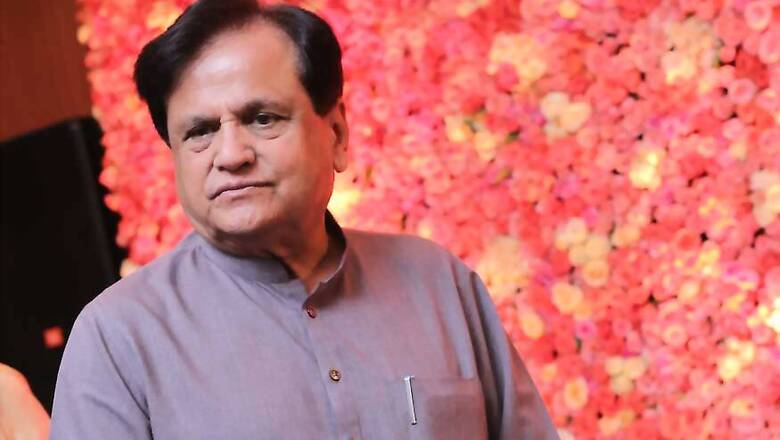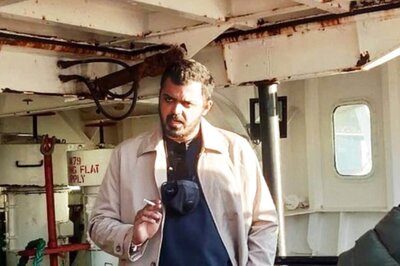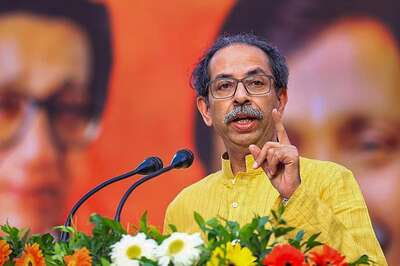
views
New Delhi: The Election Commission headquarters in New Delhi received a report from the Gujarat Returning Officer (RO) at 5:19 pm on Tuesday, seeking permission to go ahead with counting for the all-important Gujarat Rajya Sabha poll.
The report stated that during the polling, the election agent of Congress Party submitted two written applications for rejection of votes tendered by Bhola Bhai Gohil and Raghavji Bhai Patel, for violation of the procedure under Rule 39AA of the Conduct of Elections Rules, 1961, as they showed their marked ballot papers to people other than the authorized representative of the Congress Party.
The Returning Officer further reported that the ‘complaints were examined by him and even the video recording of the polling process was viewed and pursuant to that he rejected the objection raised by Congress’ election agent Shailesh Bhai Parmar’.
If the Election Commission had gone by the report of the RO then the Congress complaint would have been overruled and counting could have begun as early as 5:30 pm.
But just when the matter was being considered, a Congress delegation of Randeep Surjewala and RPN Singh met the EC and argued that ‘the Returning Officer had improperly rejected the objection of the authorized representative of the Congress candidate and contended that the said two voters had violated the secrecy of votes by not complying with the voting procedure. They submitted that the Commission can verify the position by calling for the video recording for its own viewing’.
According to highly placed sourced, this was also the time when Ahmed Patel sent an email to the Commission with the same request.
Within minutes, a delegation of Bharatiya Janata Party led by Finance Minister Arun Jaitley comprising law minister Ravi Shankar Prasad, petroleum minister Dharmendra Pradhan, power minister Piyush Goel and commerce minister Nirmala Sitharaman met the EC and sought an early commencement of counting.
The BJP argued that ‘the Returning Officer is the statutory authority to conduct the polling, counting process and to decide the validity of a ballot paper as per the rules and the Commission has no power as the field is already covered by the enacted laws’.
The Congress immediately decided to counter the points put forth by top Union ministers. Within minutes, a team led by leader of opposition in Rajya Sabha Ghulam Nabi Azad and former finance minister P Chidambaram reached Nirvachan Sadan on Ashoka Road.
This was followed by another round of delegation from the BJP and the Congress.
At this point, the Election Commission said it had heard arguments from both the sides and no more delegation would be entertained.
According to sources, the first thing the EC did at this point was a careful examination of the video in the presence of Chief Election Commissioner Achal Kumar Jyoti. The EC then evaluated the Returning Officer’s report and arguments submitted by both sides.
In light of the evidence and facts, it was decided to overrule the Returning Officer’s conclusion.
According to sources, it was the last delegation of the Congress which clinched the case of the party as it was able to cite the Kuldip Nayar case in which the five-judge bench of the Supreme Court had held that in Rajya Sabha election, open ballot only means that the MLA can show the vote to the authorized representative of his party and no one else.
The Election Commission order which came at around 11:30 pm acknowledged this ruling of the apex court. The order read: ‘If a marked ballot paper by an elector is shown to, or be seen by, anyone other than the said representative, which may violate the secrecy of the vote, has to be rejected by the Returning Officer by recourse to the provisions of sub-rule (5) to (8) of Rule 39A, read with Rule 39AA. This position has been unambiguously made clear by the Commission in the Handbook for Returning Officers (for Elections to the Council of States and State Legislative Councils) 2016-Edition vide Para 35 (ii) in Chapter X. This position has been upheld by the Supreme Court in Kuldip Nayar vs Union of India and Others (AIR 2006 SC 3127) 10.’
As per the order ‘The Rule is very clear that the elector has to show his ballot paper only to the authorized representative of his party and to no one else. In the case of independent members of the Assembly, he is not to show his ballot paper to anyone else. Thus, even the provision of the open voting at Rajya Sabha elections does not mean that the principle of secrecy of vote has been given complete go by and that the ballot paper of an elector can be shown to, or be seen by, any person present in the place of poll. Consequently, if a marked ballot paper by an elector is shown to, or be seen by, anyone other than the said Representative which may violate the secrecy of vote has to be rejected by the Returning Officer’.
After going through the video, the EC found that ‘it has been observed therefrom that the said two electors violated the voting procedure and secrecy of the ballot papers cast by them when they exercised their right to vote’.
Backed by the judgment of the Supreme Court, which stated clear guidelines of the procedure, the Commission set aside the order of the Returning Officer.
Once again, the EC has maintained its image of being an Independent and unbiased constitutional authority.




















Comments
0 comment